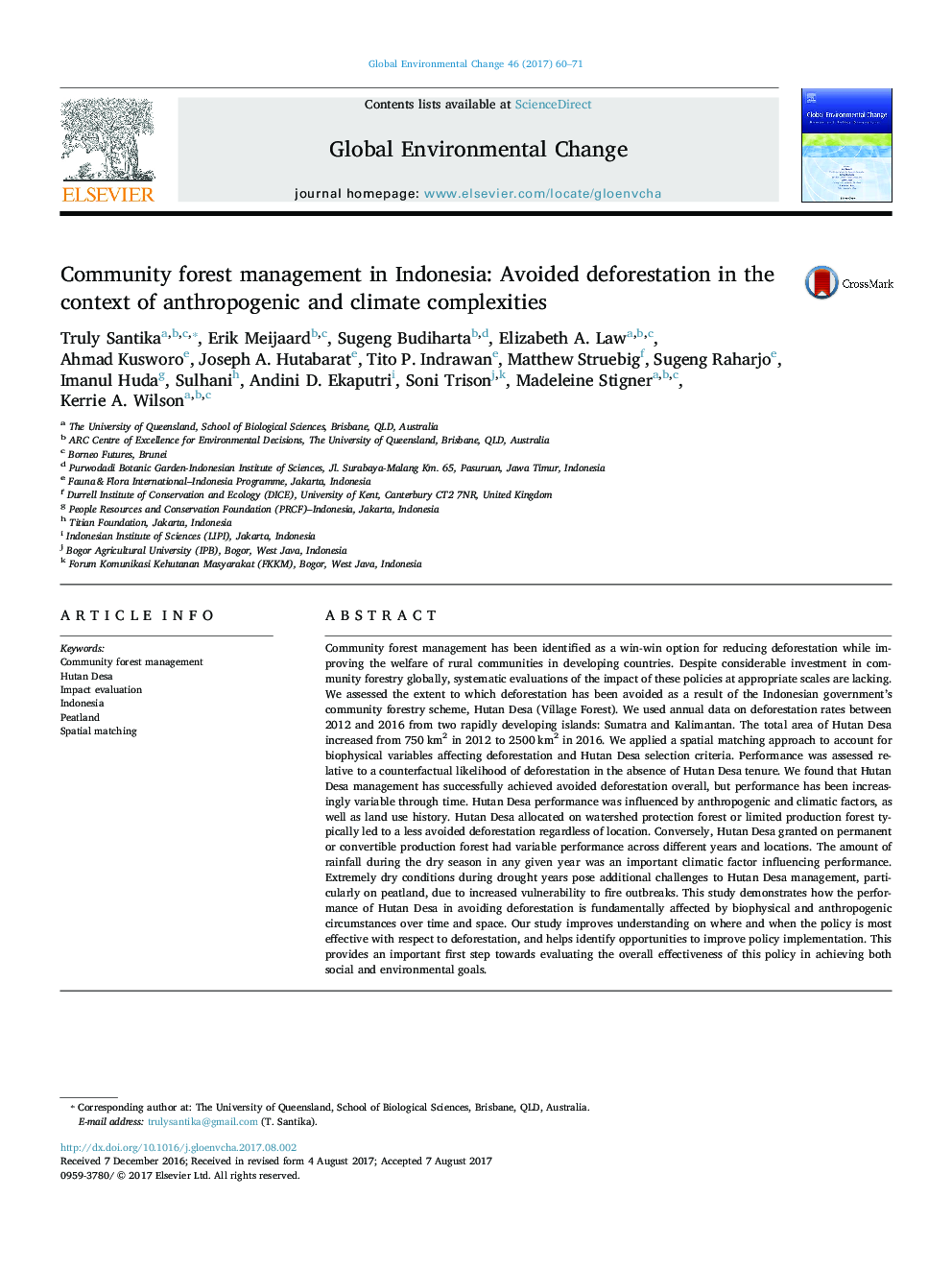| کد مقاله | کد نشریه | سال انتشار | مقاله انگلیسی | نسخه تمام متن |
|---|---|---|---|---|
| 5115884 | 1485112 | 2017 | 12 صفحه PDF | دانلود رایگان |
عنوان انگلیسی مقاله ISI
Community forest management in Indonesia: Avoided deforestation in the context of anthropogenic and climate complexities
ترجمه فارسی عنوان
مدیریت جنگل های محلی در اندونزی: جلوگیری از جنگل زدایی در زمینه پیچیدگی های انسان شناسی و آب و هوایی
دانلود مقاله + سفارش ترجمه
دانلود مقاله ISI انگلیسی
رایگان برای ایرانیان
کلمات کلیدی
مدیریت جنگل های محلی، هاتان دسا، ارزیابی تاثیر، اندونزی، زمین لرزه، تطبیق فضایی،
موضوعات مرتبط
علوم زیستی و بیوفناوری
علوم محیط زیست
علوم زیست محیطی (عمومی)
چکیده انگلیسی
Community forest management has been identified as a win-win option for reducing deforestation while improving the welfare of rural communities in developing countries. Despite considerable investment in community forestry globally, systematic evaluations of the impact of these policies at appropriate scales are lacking. We assessed the extent to which deforestation has been avoided as a result of the Indonesian government's community forestry scheme, Hutan Desa (Village Forest). We used annual data on deforestation rates between 2012 and 2016 from two rapidly developing islands: Sumatra and Kalimantan. The total area of Hutan Desa increased from 750Â km2 in 2012 to 2500Â km2 in 2016. We applied a spatial matching approach to account for biophysical variables affecting deforestation and Hutan Desa selection criteria. Performance was assessed relative to a counterfactual likelihood of deforestation in the absence of Hutan Desa tenure. We found that Hutan Desa management has successfully achieved avoided deforestation overall, but performance has been increasingly variable through time. Hutan Desa performance was influenced by anthropogenic and climatic factors, as well as land use history. Hutan Desa allocated on watershed protection forest or limited production forest typically led to a less avoided deforestation regardless of location. Conversely, Hutan Desa granted on permanent or convertible production forest had variable performance across different years and locations. The amount of rainfall during the dry season in any given year was an important climatic factor influencing performance. Extremely dry conditions during drought years pose additional challenges to Hutan Desa management, particularly on peatland, due to increased vulnerability to fire outbreaks. This study demonstrates how the performance of Hutan Desa in avoiding deforestation is fundamentally affected by biophysical and anthropogenic circumstances over time and space. Our study improves understanding on where and when the policy is most effective with respect to deforestation, and helps identify opportunities to improve policy implementation. This provides an important first step towards evaluating the overall effectiveness of this policy in achieving both social and environmental goals.
ناشر
Database: Elsevier - ScienceDirect (ساینس دایرکت)
Journal: Global Environmental Change - Volume 46, September 2017, Pages 60-71
Journal: Global Environmental Change - Volume 46, September 2017, Pages 60-71
نویسندگان
Truly Santika, Erik Meijaard, Sugeng Budiharta, Elizabeth A. Law, Ahmad Kusworo, Joseph A. Hutabarat, Tito P. Indrawan, Matthew Struebig, Sugeng Raharjo, Imanul Huda, Sulhani Sulhani, Andini D. Ekaputri, Soni Trison, Madeleine Stigner, Kerrie A. Wilson,
